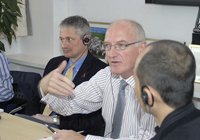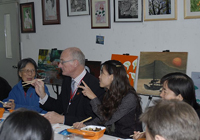
Justice Edwin Cameron at a roundtable discussion on stigma at the UNAIDS office in Beijing. Credit: UNAIDS/Zhou Dao
The South African Supreme Court Judge Edwin Cameron visited China from 27th to 31st October at the invitation of China’s Ministry of Health and UNAIDS. Through his visit, he set out to support the response to AIDS in China with a special focus on legal issues, discrimination and rights of people living with HIV.
Judge Cameron met with Chinese government officials, civil society, business leaders and people living with HIV as well as national and international media. He shared his insights gained from a decade-long battle to address AIDS in South Africa as well as successes and failures of AIDS programmes in Africa and around the world that China may be able to learn from.
Justice Cameron acknowledged that the demographics of the epidemic in Africa and China are different. South Africa has the world’s largest population living with HIV - between 5 and 6 million people - and the epidemic has affected the heterosexual population the most. In China, by contrast, the government estimates that 700,000 people are living with HIV, and the people most at risk of new infection are mainly men who have sex with men (MSM), commercial sex workers, their clients and partners, and intravenous drug users and their partners.
Nonetheless, Justice Cameron noted that the differences between the AIDS epidemics in South Africa and China are less significant than the similarities. “In China, as in South Africa, AIDS is still a disease associated with a terrible stigma,” he observed. That stigma acts as an obstacle to all aspects of HIV prevention and treatment. “Stigma is fatal,” said Justice Cameron. “Stigma prevents people from getting tested, from talking about their positive status, and from seeking help.”

Justice Cameron eating with staff and people living with HIV from the Positive Art Workshop, You An Hospital, Beijing. Credit: UNAIDS/Zhou Dao
In China, the government makes available free HIV testing, but because of stigma people are reluctant to take advantage of it. Indeed, it is estimated that more than 500,000 people may be living with HIV without knowing it. At a roundtable held at the UNAIDS’ offices in Beijing, people living with HIV gave testimonies of the impact of stigma on their lives: One woman who went to the hospital with a cold was told by the doctor not to lie on the bed because she was HIV positive; A man living with HIV now limps because doctors refused to operate on him; Another man living with HIV was told not to eat in the canteen of a local office of the China’s Center for Disease Control.
“Casual transmission of HIV is virtually impossible,” said Justice Cameron. “But the general public in China appears not to know this.” Justice Cameron noted that he would probably have been denied a visa under normal circumstances because of China’s travel restrictions on people living with HIV (the Chinese Ministry of Health facilitated the issuance of a visa to Justice Cameron).
Reducing stigma in society is urgently needed and may require various approaches. At the UNAIDS roundtable, several participants voiced the need for greater education about HIV. Justice Cameron also identified educational outreach as a key activity for reducing stigma, as well as raising awareness around HIV prevention.
Justice Cameron also engaged Chinese audiences on the role of the law in reducing stigma. At Peking University’s law school, he participated in a roundtable discussion on the role of human rights in HIV prevention and AIDS treatment in China. While courts in South Africa have been pivotal in reducing stigma and advancing the rights of people living with HIV, at the present time Chinese courts are in most cases refusing to accept cases dealing with discrimination against people living with HIV.

Justice Cameron writing a word of thanks to staff at You An Hospital, Beijing. Credit: UNAIDS/Zhou Dao
But not all stigma comes from external sources. As Justice Cameron wrote in his memoirs, Witness to AIDS, and as he has said to the many groups with whom he has interacted in China, after being diagnosed with HIV he felt contaminated and ashamed. Initially, he believed that his feelings derived from the fact that he had contracted HIV through homosexual sex, but he discovered that such feelings of shame and contamination prevail regardless of the sexual orientation, gender, race, or culture of the HIV-positive individual.
In this regard, Justice Cameron highlighted that experience shows that a strong movement of people living with HIV that affords mutual support and a voice at local and national levels is particularly effective in tackling stigma.
Stigma and accompanying discrimination are widely recognized as significant barriers to HIV prevention, treatment and care services reaching those who need them most. Without concerted action to eliminate stigma, the goal of universal access to these vital services will be impossible to achieve.






